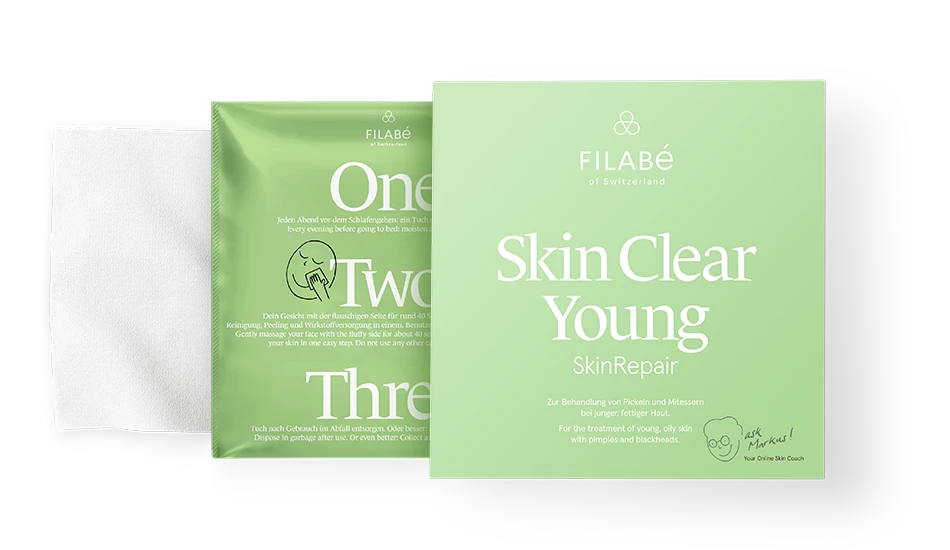Impure skin during pregnancy — a common problem, but nothing to worry about
Pregnancy is probably one of the most beautiful nine months in the life of an expectant mother. Bubbling happiness hormones and the anticipation of the child make this time something very special.
Despite these happy circumstances, mothers often complain of mood swings, discomfort and skin problems such as impure skin, hyperpigmentation or super-sensitive, irritated skin, triggered by pregnancy.
However, the right care products and a little patience can significantly improve the appearance of your skin, so that you feel comfortable in your own skin even during pregnancy.
What causes blemished skin during pregnancy and who is particularly affected?
Every pregnancy is different. While some women enjoy radiant and firm skin, others notice major changes. What they all have in common is that their hormones go crazy. This leads to an increased production of other hormones, such as androgens (i.e. male hormones, especially testosterone).
This leads to increased sebum production.
And that's where the classic acne cycle begins: more oil on the skin leads to more clogged pores. And the result can range from oily skin and single blackheads to acute acne. The face, back and even the décolletage can be affected.
Almost half of all pregnant women are affected, and women who have already suffered from skin problems during puberty are more likely to suffer again.
Summary:
- Blemished skin during pregnancy is caused by pregnancy hormones.
- Women who suffered from blemished skin during puberty are much more likely to be affected.
- Pregnancy acne mainly manifests itself on the face, back and décolleté.
How long does pregnancy acne last?
Impure skin during pregnancy usually occurs in the first or last months of pregnancy. From the fourth month onwards, many women experience a relief of symptoms.
In rare cases, pregnancy acne can also develop during breastfeeding or while weaning, as hormonal fluctuations are particularly pronounced during these periods.
Impure skin during pregnancy is not uncommon. Fortunately, the symptoms usually subside after pregnancy, but it is still worth caring for the skin and thus improving the complexion, as otherwise acne scars often remain.
What to avoid
Impure skin during pregnancy is extremely problematic for many mothers-to-be, as pregnant women are not allowed to take many acne medications. That is why it is so important to switch to alternative, gentle skin care products.
The following active ingredients in skin care products should be avoided at all costs during pregnancy:
- Isotretinoin (found in many acne medications).
- Retinol (like isotretinoin, also belongs to the vitamin A acid derivatives, but is often also found in non-prescription skin care products).
- Skin lighteners: Many women notice pigment spots during pregnancy. Most skin lighteners should be avoided, as they often not only irritate the skin and cause allergies, but some substances can also reach the fetus through the bloodstream. So it is worth waiting until after the baby is born.
- Formaldehyde: This can be found in some beauty products for nails and hair. Formaldehyde should be avoided as it is a category 1B carcinogen with a toxicological threshold.
- Fragrances and essential oils: As relaxing as they may be, artificial fragrances and essential oils can be harmful to the baby. Some essential oils can even stimulate labour and should be avoided.
- Other ingredients that are found in many cosmetic products (such as plasticizers, parabens or triclosan) should also be avoided.
In addition to active ingredients in skin care products, many foods are also off-limits. For example, pregnant women should not eat raw or undercooked meat products. These foods can contain germs, such as toxoplasma or listeria, that can be dangerous for the mother and the unborn child.
For a complete list of foods to avoid during pregnancy, you should definitely consult a specialist.
What should be noted
To stay healthy during pregnancy and to alleviate the symptoms of pregnancy acne as much as possible, it is also worth paying attention to your diet. Everyone's skin reacts differently, which is why it is almost impossible to give general tips.
When you eat, make sure you get enough of important nutrients such as folic acid, iron, calcium, zinc, vitamins A, B6, B12, C, D, iodine, magnesium and, in particular, omega-3 fatty acids. Drinking enough fluids also helps to flush out harmful substances through the kidneys, so that the skin is not put under additional strain.
When it comes to skincare, look for products that offer deep pore cleansing and light exfoliation, as well as sebum‑reducing ingredients; this way, the pores become less clogged.
In addition, the products should contain as few additives as possible, as these put additional stress on the skin, on top of the pregnancy factors.
Filabé for a healthy and gentle skin care
To prevent excess sebum during pregnancy, we recommend you use Filabé Skin Clear Young (up to 22 years old) or Skin Clear Adult (from 22 years old).
Filabé Irritated Skin prevents irritated, itchy and sensitive skin.
Filabé care products are free from additives (such as fats, oils, silicones, preservatives, fragrances, etc.).
So you can care for your skin without worry, even during pregnancy. They also provide a deep pore cleanse and gently exfoliate your skin. The ideal combination for your skin during pregnancy.
Not sure which product to choose?
Take our skin type quiz now to find the right product for you, so you can enjoy your pregnancy free from blemished skin.





